
-
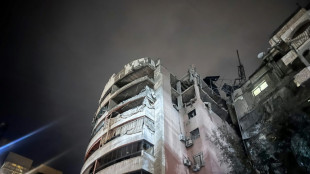 Hezbollah official targeted in deadly Israeli strike on Beirut
Hezbollah official targeted in deadly Israeli strike on Beirut
-
Israel PM drops security chief nominee under fire from Trump ally
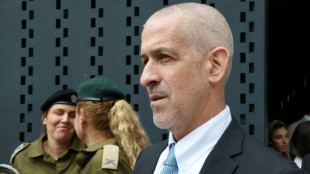
-
 Stock markets edge up but Trump tariff fears dampen mood
Stock markets edge up but Trump tariff fears dampen mood
-
South Korea court to rule Friday on president impeachment

-
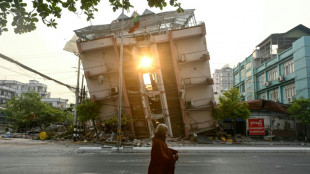 'Can collapse anytime': Mandalay quake victims seek respite outdoors
'Can collapse anytime': Mandalay quake victims seek respite outdoors
-
Stock markets edge back but Trump tariff fears dampen mood

-
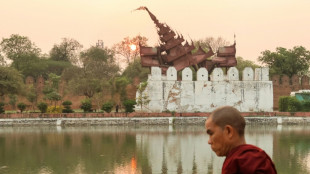 Myanmar holds minute of silence for more than 2,000 quake dead
Myanmar holds minute of silence for more than 2,000 quake dead
-
Kenya president still handing cash to churches despite his own ban
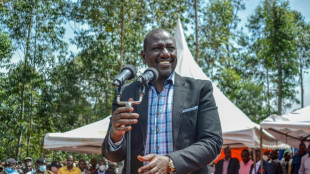
-
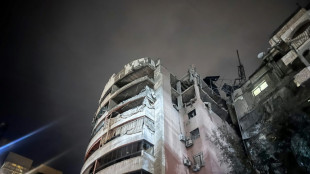 Israeli strike on Beirut kills three
Israeli strike on Beirut kills three
-
Russia-born Kasatkina says 'didn't have much choice' after Australia switch

-
 Carmakers face doubts and jolts over US tariffs
Carmakers face doubts and jolts over US tariffs
-
China holds large-scale military drills around Taiwan
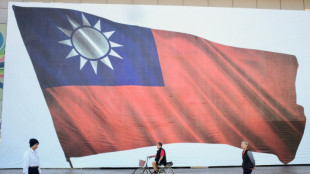
-
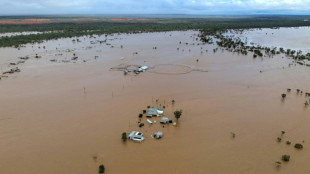 'Heartbreaking' floods swamp Australia's cattle country
'Heartbreaking' floods swamp Australia's cattle country
-
South Korean baseball put on hold after fan killed at stadium

-
 Celtics, Thunder power toward NBA playoffs, Lakers shoot down Rockets
Celtics, Thunder power toward NBA playoffs, Lakers shoot down Rockets
-
French prosecutors demand Volkswagen face fresh Dieselgate trial

-
 Sam Mendes to launch four 'Beatles' movies in same month
Sam Mendes to launch four 'Beatles' movies in same month
-
Battery boom drives Bangladesh lead poisoning epidemic
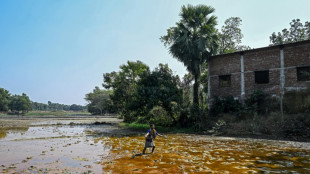
-
 South Korea president impeachment ruling Friday: court
South Korea president impeachment ruling Friday: court
-
Israel strikes Hezbollah operative in Beirut, kills 3
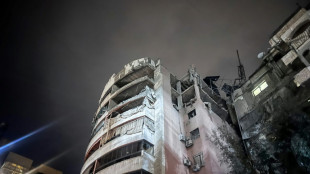
-
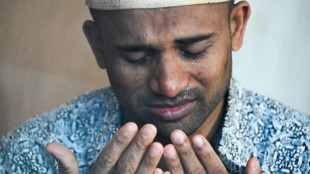 Desperate Rohingya mark Eid in Indonesia limbo
Desperate Rohingya mark Eid in Indonesia limbo
-
Sam Kerr has 'full support' of Australia squad, vice-captain says

-
 Asian markets edge back but Trump tariff fears dampen mood
Asian markets edge back but Trump tariff fears dampen mood
-
Teenage opener Konstas gets Australia contract with Ashes on horizon

-
 S. Korea court to rule Friday on President Yoon impeachment
S. Korea court to rule Friday on President Yoon impeachment
-
Myanmar to hold minute of silence for more than 2,000 quake dead

-
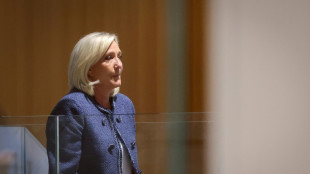 Far-right leaders rally around France's Le Pen after poll ban
Far-right leaders rally around France's Le Pen after poll ban
-
SpaceX launches private astronauts on first crewed polar orbit

-
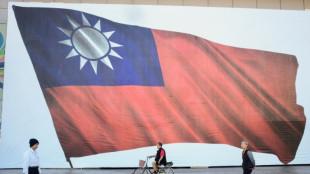 China launches military drills around Taiwan
China launches military drills around Taiwan
-
Political support leading to increasing fallout for crypto

-
 France's Le Pen seeks to keep presidency hopes alive after election ban
France's Le Pen seeks to keep presidency hopes alive after election ban
-
Trump tariffs threaten Latin American steel industry

-
 'Tariff man': Trump's long history with trade wars
'Tariff man': Trump's long history with trade wars
-
Tariffs: Economic 'liberation' or straitjacket?
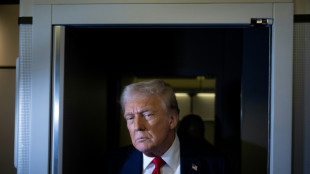
-
 Undocumented migrants turn to Whatsapp to stay ahead of US raids
Undocumented migrants turn to Whatsapp to stay ahead of US raids
-
What next for Venezuela as Trump goes after oil revenues?
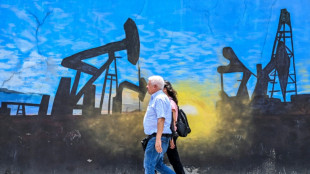
-
 New Zealand Rugby and Ineos settle sponsorship dispute
New Zealand Rugby and Ineos settle sponsorship dispute
-
China says launches military exercises around Taiwan
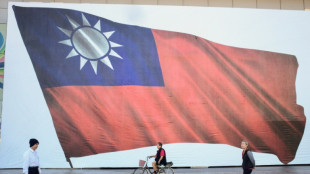
-
 Team New Zealand fails in bid to host 2027 America's Cup
Team New Zealand fails in bid to host 2027 America's Cup
-
iSON Xperiences Appoints Ricardo Langwieder as Global Chief Sales Officer to Drive Growth and Innovation

-
 Zeus North America Mining Corp. Defines High-Priority Drill Targets at Cuddy Mountain
Zeus North America Mining Corp. Defines High-Priority Drill Targets at Cuddy Mountain
-
Fluent Bit v4 Released: Transforming Telemetry Data Management

-
 Helium One Global Ltd Announces Jackson-4 Flow Testing and Gas Sampling Analysis
Helium One Global Ltd Announces Jackson-4 Flow Testing and Gas Sampling Analysis
-
Trump says will be 'kind' with tariffs as deadline looms
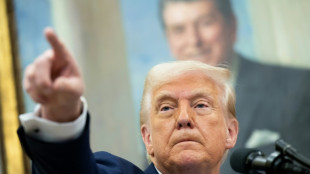
-
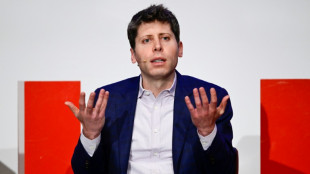 OpenAI says it raised $40 bn at valuation of $300 bn
OpenAI says it raised $40 bn at valuation of $300 bn
-
Safely back on Earth, once-stranded US astronauts ready to fly again

-
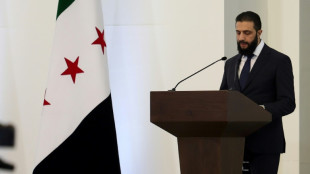 Syria president says new authorities can't satisfy everyone
Syria president says new authorities can't satisfy everyone
-
US robbers who touted crime on Instagram jailed

-
 Fernandes 'not going anywhere', says Man Utd boss Amorim
Fernandes 'not going anywhere', says Man Utd boss Amorim
-
US regulators tell 23andMe to protect genetic data


In Turkey, new technologies reinforce repression
With anti-government protests sweeping across Turkey, the authorities have used all technological means to try to curb them, from restricting internet access to using facial recognition to identify protesters, who have been forced to adapt.
Amid a ban on protests, nearly 2,000 people have been arrested in connection with the demonstrations that erupted on March 19 following the detention of Istanbul's mayor Ekrem Imamoglu on graft charges.
As well as those apprehended in the streets, many others have been arrested in pre-dawn raids at their homes after being identified from footage or photos taken by the police during the demonstrations.
So far, 13 Turkish journalists have been detained for covering the protests, including AFP photographer Yasin Akgul, who was charged with "taking part in illegal rallies and marches" on the basis of images shot by the police.
For Orhan Sener, a digital technologies expert, the use of technology marks a major departure from 2013, when a small protest against plans to demolish Gezi Park in central Istanbul snowballed into a wave of national unrest over the rule of Recep Tayyip Erdogan, who was prime minister at the time.
"The security forces' information technology capabilities have increased considerably since then," Sener said.
"During the Gezi movement, the protesters dominated social networks and the police weren't able to identify them," he said.
"But today, when you join a demonstration in Turkey, your face is recognised by a camera and the system cross-references it with your profile on social networks."
- Faces masked -
Faced with such a risk, many demonstrators are now covering their heads and faces with hats, masks and scarves.
In Istanbul, police have frequently surrounded protesters and ordered them to uncover their faces so they can be filmed, refusing to let them go if they do not, generating widespread distress for many young people, AFP correspondents said.
"Every means of pressure generates a countermeasure. We will soon see greater use of different clothing, glasses or make-up to thwart facial recognition technologies," said Arif Kosar, who specialises in the impact of new technologies.
"But I don't think facial recognition technology is the main source of pressure today. The use of disinformation to smear the protests, or neutralise and divide them, plays a more important role," he said.
Erdogan has denounced the protests as "street terror", accusing participants of "vandalising" a mosque and a cemetery, charges the opposition has denied.
"Authoritarian regimes now know how to use the internet to their advantage. They have found ways of censoring it," Sener said.
"But above all, they use it for their own propaganda."
- 'Moving towards a surveillance state' -
Immediately after Imamoglu's arrest in a pre-dawn raid, which he recounted on X before being taken away, the authorities started reducing bandwidth for internet users in Istanbul, rendering access to social networks impossible for 42 hours.
They also asked the social media platform X to close more than 700 accounts belonging to journalists, news organisations, political figures and students among others, the platform said.
"There was no court decision behind the bandwidth reduction or the bid to block X accounts. These measures were put in place arbitrarily," said Yaman Akdeniz, a law professor and head of Turkey's Freedom of Expression Association (IFOD).
He said there was legislation being prepared that would require messaging services such as WhatsApp, Signal and Telegram to open offices in Turkey and disclose users' identities to the authorities.
"We are moving towards a surveillance state," Akdeniz said.
Since 2020, internet service providers have provided data on online activities and the identity of internet users to the Information and Communication Technologies Authority (BTK), the opposition news website Medyascope revealed in 2022.
"By law, the BTK can only keep the data collected for two years. However, we have seen data going back 10 years being provided to prosecutors during the investigation into the Istanbul mayor," Akdeniz said.
"This data retention, despite the law, for purposes which are unknown, opens the way for arbitrary practices," he said.
For Sener, activism in the real world and online "used to be two different worlds, but now they are intertwined".
With facial recognition, "the government is trying to discourage people from joining demonstrations, while hindering their mobilisation through social networks," he said.
B.Finley--AMWN